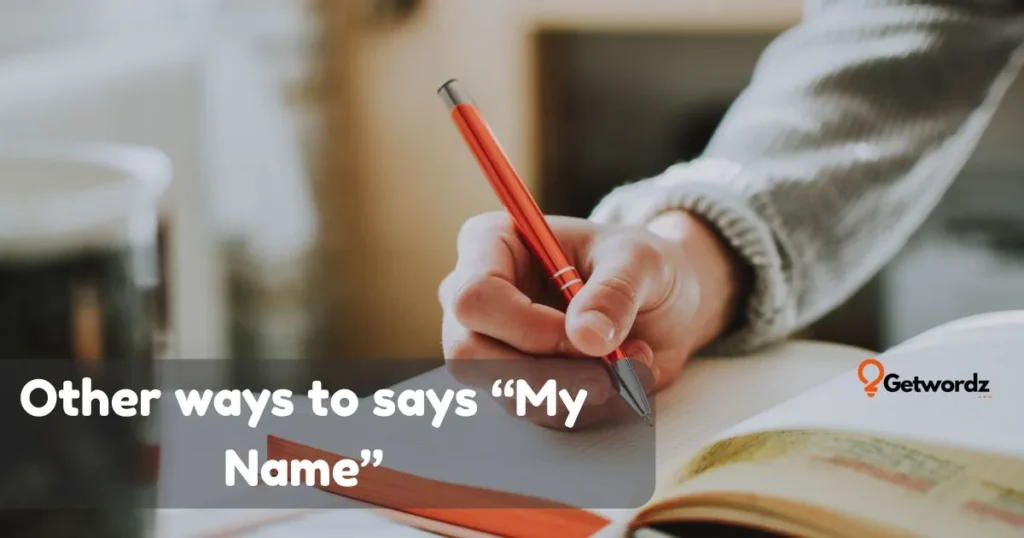My name is, it’s the first phrase most of us use when meeting someone new, yet it often feels too common or plain. Whether you are introducing yourself to a coworker, meeting new friends, or writing a social media bio, saying my name can sound a bit dull after a while. Many people look for better ways to say it that sound more natural, friendly, and confident.
This post shares simple and creative alternatives to my name that make your introductions stand out. You will find expressions that fit every situation , from professional meetings to casual conversations. Each one helps you sound more authentic and memorable.
Keep reading to discover the best and most unique ways to say my name is and leave a lasting first impression.
1. I’m Called [Name]
Scenario: You’re at a casual event or chatting online and want to sound friendly but not too formal. Saying I’m called feels relaxed and natural in everyday conversations.
Explanation: This phrase works great as a creative alternative to my name. It has a conversational tone and feels approachable, making it ideal for informal or friendly settings.
Examples:
- I’m called Mia. Nice to meet you.
- I’m called Jake and I’ll be your guide today.
- I’m called Emma but you can just say Em.
Why It Works: It’s simple and memorable. Using I’m called gives your introduction a touch of warmth and individuality.
2. People Know Me As [Name]
Scenario: When talking about a nickname or an identity you’re known for in a certain group or community.
Explanation: This phrase is a confident and slightly playful way to introduce yourself. It’s a unique expression that highlights your personality and how others perceive you.
Examples:
- People know me as Jay the storyteller.
- People know me as Sam, the one who always brings snacks.
- People know me as Liz, the creative mind behind this project.
Why It Works: It adds character to your introduction and makes it more personal and engaging. It’s a fun and social way to share who you are beyond your name.
3. They Call Me [Name]
Scenario: Imagine meeting new coworkers who ask what they should call you. Saying they call me feels confident and laid-back.
Explanation: It’s an easy and creative alternative to my name that shows you’re comfortable and open. It often carries a friendly or cool vibe.
Examples:
- They call me Alex but you can just say Al.
- They call me Grace at work.
- They call me Leo the problem solver.
Why It Works: This expression feels approachable and adds a casual spark to introductions perfect for both online and real-life conversations.
4. You Can Call Me [Name]
Scenario: When you want to make someone feel comfortable using your name especially in a new setting or workplace.
Explanation: It’s polite and welcoming, often used in professional or semi-formal introductions. It invites connection and shows openness.
Examples:
- You can call me Sarah. I’m the new designer.
- You can call me Ben if that’s easier.
- You can call me Lily happy to connect.
Why It Works: It balances professionalism and friendliness making it a versatile phrase for many settings.
5. Friends Call Me [Name]
Scenario: When you’re introducing yourself in a group or social situation and want to sound approachable.
Explanation: This phrase adds a personal touch to your introduction. It shows how you’re known among close friends making it sound inviting.
Examples:
- Friends call me Dani but my full name is Danielle.
- Friends call me Mike, always happy to help.
- Friends call me Zee. It’s short and easy.
Why It Works: It humanizes your introduction and helps build instant familiarity.
6. My Friends Know Me As [Name]
Scenario: When sharing a story or introducing yourself in a more personal or storytelling way.
Explanation: This phrase works as a creative alternative to my name and is often used in narratives, social media captions or informal talks.
Examples:
- My friends know me as Kay, the one who’s always late.
- My friends know me as Nico the traveler.
- My friends know me as Jess the planner.
Why It Works: It sounds personal and authentic, helping you connect through shared experience or humor.
7. You Might Know Me As [Name]
Scenario: Perfect for online introductions or when talking to people who might recognize you from somewhere.
Explanation: It’s a modern and engaging phrase often used by creators, professionals or influencers.
Examples:
- You might know me as Maya from TikTok.
- You might know me as Jake, the guy who runs the food blog.
- You might know me as Lisa from the marketing team.
Why It Works: It adds curiosity and recognition helping you stand out confidently.
8. The Name’s [Name]
Scenario: When you want a cool or cinematic introduction like in a movie-style conversation.
Explanation: This phrase is short, stylish and memorable. A bold alternative to my name is.
Examples:
- The name’s Jack, pleasure to meet you.
- The name’s Claire and I handle design.
- The name’s Noah, your go-to for tech help.
Why It Works: It creates a confident and lasting impression great for informal yet impactful moments.
9. I Go By [Name]
Scenario: Useful when your preferred name differs from your legal one or when sharing your nickname.
Explanation: This modern gender-neutral phrase is polite and casual, a simple way to express identity.
Examples:
- I go by Max, short for Maximilian.
- I go by Elle, that’s what everyone calls me.
- I go by T nice to meet you.
Why It Works: It’s authentic and inclusive and works perfectly across professional or personal situations.
10. Officially It’s [Name]
Scenario: When joking about your formal name versus your casual one.
Explanation: It’s a friendly and slightly humorous phrase that makes introductions lighthearted.
Examples:
- Officially it’s Jonathan but I go by Jon.
- Officially it’s Rebecca but no one calls me that.
- Officially it’s Alexander though Alex works fine.
Why It Works: It feels natural and funny letting people know how you prefer to be addressed.
11. Everyone Calls Me [Name]
Scenario: When you’re introducing yourself to someone new and want to mention what others commonly call you.
Explanation: This phrase is a friendly and relaxed alternative to my name. It gives your introduction a natural flow while showing how people usually address you.
Examples:
- Everyone calls me Sam. It’s easier to remember.
- Everyone calls me Liza but my full name is Elizabeth.
- Everyone calls me Tom, even my teachers.
Why It Works: It feels open and conversational. It’s great for making your introduction feel easygoing and approachable.
12. Most People Know Me As [Name]
Scenario: When you’re sharing your identity with someone who might recognize you by another name.
Explanation: This phrase is polite and smooth, ideal for introducing yourself to someone who might already have heard of you. It’s a confident and natural way to express your identity.
Examples:
- Most people know me as Drew but my actual name is Andrew.
- Most people know me as Ella from our school group.
- Most people know me as Nate online.
Why It Works: It helps clarify your name or nickname naturally. It’s both friendly and flexible for social or professional use.
13. I Respond To [Name]
Scenario: When someone mispronounces or confuses your name, this phrase adds humor and clarity.
Explanation: This expression is slightly playful and casual. It’s a creative alternative that works well in group settings or lighthearted introductions.
Examples:
- I respond to Mia most of the time.
- I respond to Jake or Jay whichever you prefer.
- I respond to Lily even when someone calls loudly.
Why It Works: It adds personality and a friendly tone to introductions while keeping things simple and fun.
14. You’ll Hear People Call Me [Name]
Scenario: When you’re introducing yourself to someone new in a group or work setting.
Explanation: This phrase sounds natural and confident. It helps others quickly remember how you’re commonly addressed in different circles.
Examples:
- You’ll hear people call me Alex around the office.
- You’ll hear people call me Tasha during events.
- You’ll hear people call me Ben in the meetings.
Why It Works: It gives a sense of familiarity and connection, making your introduction more personal and real.
15. Around Here I’m Known As [Name]
Scenario: When you’re part of a team, group, or community and want to sound friendly and integrated.
Explanation: This phrase is warm and welcoming, showing you belong in that setting. It’s a nice creative alternative to my name for community introductions.
Examples:
- Around here I’m known as Mike the helper.
- Around here I’m known as Jess the organizer.
- Around here I’m known as Rob the creative guy.
Why It Works: It builds instant connection and makes you sound approachable and part of the group.
16. People Usually Call Me [Name]
Scenario: When you want to tell someone the name most people prefer to use for you.
Explanation: This phrase is polite, neutral, and fits both formal and casual introductions. It’s a reliable alternative to my name that feels friendly and clear.
Examples:
- People usually call me Andy. It’s short for Andrew.
- People usually call me Jess even though my name is Jessica.
- People usually call me Leo because it’s easier.
Why It Works: It’s respectful, easy to understand, and suitable for almost every kind of social interaction.
17. You’ll Probably Hear [Name] A Lot
Scenario: When introducing yourself in a humorous or confident way.
Explanation: This phrase has a playful tone and works perfectly for relaxed or creative environments. It shows confidence while staying lighthearted.
Examples:
- You’ll probably hear Mia a lot. I’m always around.
- You’ll probably hear Jake a lot during this project.
- You’ll probably hear Lily a lot in the office chats.
Why It Works: It adds humor and makes your introduction stand out, giving people an easy way to remember you.
18. Just Call Me [Name]
Scenario: When you want to make your introduction short, casual, and friendly.
Explanation: This phrase is one of the simplest and most natural alternatives to my name. It removes formality and makes others feel at ease.
Examples:
- Just call me Ben everyone does.
- Just call me Ella, it’s easier that way.
- Just call me Nate, happy to meet you.
Why It Works: It keeps your introduction comfortable and down-to-earth while sounding kind and genuine.
19. Officially People Address Me As [Name]
Scenario: When you’re introducing yourself in a professional or formal setting.
Explanation: This phrase is polite and fits perfectly in emails, meetings, or presentations. It’s a more sophisticated variation of my name.
Examples:
- Officially people address me as Mr. Carter.
- Officially people address me as Dr. Maria.
- Officially people address me as Professor John.
Why It Works: It adds professionalism and respect to your introduction while maintaining a confident tone.
Read More: 30 Other Ways to Say “Good Morning” with Examples!
20. On Paper I’m [Name]
Scenario: When joking or making light conversation about your formal name versus your casual one.
Explanation: This phrase blends humor and honesty. It’s a creative way to introduce yourself when you prefer a different name in everyday life.
Examples:
- On paper I’m Jonathan but everyone calls me Jon.
- On paper I’m Rebecca but I go by Becca.
- On paper I’m Thomas but I prefer Tom.
Why It Works: It feels natural and conversational, letting people know your preferred name while keeping it friendly and relatable.
21. People Know Me By [Name]
Scenario: When you want to sound confident while introducing yourself to someone new or in a group.
Explanation: This phrase works well for both casual and professional situations. It gives a polished touch while keeping your tone approachable and friendly.
Examples:
- People know me by Chris from the marketing team.
- People know me by Ella from our online community.
- People know me by Jason at the workshop.
Why It Works: It highlights familiarity and confidence. It’s a professional yet warm way to make an introduction that people remember.
Read More: 30 Other Ways to Say “In Conclusion” With Examples!
22. I Usually Go By [Name]
Scenario: When you use a nickname or a preferred name that differs from your full one.
Explanation: This is one of the most common and natural alternatives to my name is. It’s friendly, easy to use, and helps people remember what to call you.
Examples:
- I usually go by Sam instead of Samuel.
- I usually go by Kate. It’s simpler.
- I usually go by Ben everyone calls me that.
Why It Works: It’s natural and clear, perfect for introductions in both personal and professional environments.
23. You Can Call Me [Name]
Scenario: When you want to make others comfortable and show openness.
Explanation: This is a simple, universal phrase that fits almost any introduction. It invites people to connect without sounding too formal.
Examples:
- You can call me Alex, happy to meet you.
- You can call me Mia. I prefer short names.
- You can call me Nick, it’s what most people use.
Why It Works: It creates an instant connection and sounds warm, friendly, and welcoming.
24. My Friends Call Me [Name]
Scenario: When you want to sound personal and inviting, especially in social or casual contexts.
Explanation: This phrase helps others see the friendly side of your personality. It’s a creative and relaxed alternative to my name.
Examples:
- My friends call me Lily. It’s short for Lillian.
- My friends call me Jake but my full name is Jacob.
- My friends call me Nina. It’s easier to say.
Why It Works: It builds warmth and trust, letting others know how you prefer to be addressed naturally.
25. I Go By The Name [Name]
Scenario: When you’re introducing yourself with a confident and stylish tone.
Explanation: This phrase adds character to your introduction. It works well in creative, artistic, or public settings.
Examples:
- I go by the name Leo. You’ve probably heard it.
- I go by the name Ava. It stands out.
- I go by the name Max. Nice to meet you.
Why It Works: It’s simple yet bold, giving your introduction a bit of personality and flair.
26. I’m Better Known As [Name]
Scenario: When people recognize you by a different or shorter name.
Explanation: This phrase works great when clarifying what people usually call you. It’s clear and slightly formal, suitable for presentations or introductions.
Examples:
- I’m better known as Tom rather than Thomas.
- I’m better known as Liz from our social group.
- I’m better known as Ray on social media.
Why It Works: It balances professionalism and friendliness, helping others remember you easily.
27. Everyone Knows Me As [Name]
Scenario: When you want to express familiarity and openness in casual conversations.
Explanation: This phrase gives your introduction a friendly and confident vibe. It’s great for both social and group settings.
Examples:
- Everyone knows me as Jake from the club.
- Everyone knows me as Ella in our neighborhood.
- Everyone knows me as Ben from the class.
Why It Works: It sounds natural and inviting, helping you make a strong and memorable first impression.
28. I Answer To [Name]
Scenario: When you want to add humor or show your personality during introductions.
Explanation: This phrase adds a fun and quirky twist to the usual self-introduction. It’s great for light-hearted settings and casual talks.
Examples:
- I answer Leo especially when coffee’s involved.
- I answer to Sarah and sometimes to “hey you.”
- I answer to Nick whenever someone calls loudly.
Why It Works: It’s witty and memorable, giving your introduction a unique and friendly tone.
29. Call Me Simply [Name]
Scenario: When you want your introduction to sound simple and polite.
Explanation: This phrase is ideal for both formal and informal situations. It shows confidence without sounding stiff.
Examples:
- Call me simply Emma, it’s easier to remember.
- Call me simply Alex, that’s what everyone does.
- Call me simply Mike, nice meeting you.
Why It Works: It makes you sound respectful, approachable, and clear in communication.
30. People Around Me Call Me [Name]
Scenario: When you want to describe how people in your circle usually refer to you.
Explanation: This phrase adds a personal touch, making your introduction sound genuine and natural.
Examples:
- People around me call me Tom, it just stuck.
- People around me call me Anna from school.
- People around me call me Jake the funny one.
Why It Works: It’s conversational, relatable, and perfect for friendly introductions that feel real and effortless.
Pros✅and Cons❌of Saying My Name Is
Pros✅
- It’s clear and easy for everyone to understand
- Works in both formal and informal introductions
- Helps you quickly establish identity in any setting
- Sounds polite and direct, making communication simple
Cons❌
- Can sound too plain or repetitive in frequent use
- Lacks personality or emotional warmth
- May feel too stiff in friendly or casual conversations
- Doesn’t help you stand out in creative or social introductions
Closing words
Introducing myself may seem simple, but the way I say my name can shape first impressions. This post shared creative and natural alternatives that make my introductions sound more confident, engaging, and memorable.
Whether I am speaking to a new colleague, chatting with friends, or writing an online bio, these expressions help me sound genuine and stand out. Each phrase offers a better way to express your personality through simple and clear wording.
Using the right introduction builds connection and trust. It shows confidence without feeling forced or repetitive. Explore these phrases until you find the one that feels most natural to you.




